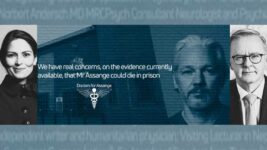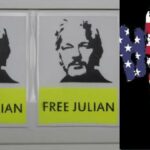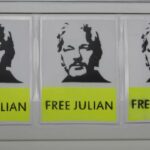In the Final Hours of the Assange Extradition, Doctors Call on UK Home Secretary to See Reason

The final decision on whether to extradite Australian journalist Julian Assange to the United States is currently before UK secretary of state for the Home Department Priti Patel.
The conservative MP is expected to make her determination in the coming days, as the deadline to do so is the 19 June.
Doctors for Assange sent an open letter to the home secretary last Friday, outlining that signing off on the extradition would be “medically and ethically unacceptable” as the WikiLeaks founder’s extremely compromised health has only worsened since the courts approved passage to the US.
If Patel greenlights extradition, as her past politicking suggests she’s likely to, Julian’s legal team can make one final appeal to the UK High Court of Justice, while there’s further growing hope that new Australian PM Anthony Albanese may be conducting behind-the-scenes negotiations for release.
Consisting of more than 300 medical practitioners from 35 countries, the doctors imply that if Patel does approve extradition, it would likely constitute negligence, as the UK court system made its decision to extradite without taking his “current health status into account”.
In its second letter to the home secretary, Doctors for Assange insists that by refusing extradition, Patel can save herself, her government and her nation from complicity in the continuing “slow-motion execution of this award-winning journalist, arguably the foremost publisher of our time”.
A flawed process
Assange has been held in London’s Belmarsh Prison since 14 April 2019, often in conditions akin to solitary confinement. Initially, he served a short sentence over a minor UK breach of bail. So, since September 2019 onwards, he’s unnecessarily been remanded on behalf of the US.
The White House is seeking to extradite the Australian over an 18 count espionage indictment carrying a maximum of 175 years prison, that relates to his having published thousands of classified US documents over 2010-11, which were leaked to him by former US Army officer Chelsea Manning.
In January 2021, the UK District Court refused extradition on medical grounds, outlining that while Washington’s case held, the harsh US prison system couldn’t guarantee his life.
But, after the ruling, the White House gave assurances on appeal and the High Court approved extradition last December.
Doctors for Assange point out that while the US did provide four assurances in February 2021, the Australian citizen’s health has deteriorated dramatically since then – most significantly when he suffered a mini-stroke in October – and his current health status isn’t being factored into decisions.
The White House was initially seeking to place Assange in its most extreme form of solitary detention on arrival in the US. And the assurances are considered to be unreliable and submitted late in the appeals process, which is in line with many other extrajudicial aspects of the case.
A UK recommended precedent
The doctors first wrote to Patel in late 2019, outlining that the UN special rapporteur on torture and two medical experts had assessed Assange’s treatment as constituting “prolonged psychological torture”. But her office replied publicly that those allegations were “unfounded and wholly false”.
Last week, Doctors for Assange asserted that Patel’s “denial of the cruel, inhuman treatment inflicted on Mr Assange was then, and is even more so now, irreconcilable with the reality of the situation”, as is evidenced by the global outpouring of expert statements to the contrary.
These experts, who include “advocates of press freedom and the rule of law”, have warned that the case will have a chilling effect upon exposing government crimes globally, as it’s setting a precedent where the extradition of foreign nationals on espionage crimes committed overseas can be sought.
However, Patel supports a 2016 initiative to toughen the UK Official Secrets Act 1989, which led to a September 2020 report recommendation for Britain to commence treating “unofficial disclosures” of classified government information with the same severity as espionage.
The Home Department produced the official response, which posits that unauthorised disclosures be treated in a similar manner to spying and laws be established that allow “non-British citizens” to be prosecuted even if their suspect actions are committed in other countries, similar to Assange’s case.
Will Canberra finally step in?
The change of Australian PM has imbued the campaign to see Assange freed with new hope. Gabriel Shipton, the brother of Townsville-born Assange, told the BBC that his family is quietly confident the Albanese government is currently in backdoor negotiations to see Julian freed.
The Morrison government was perceived as complicit over the last two years of extradition proceedings and negotiations, which have blatantly been flouting the rule of law, as the former prime minister stated that Assange would receive consular assistance and nothing more.
New Labor PM Anthony Albanese, however, is one of only 36 federal parliamentarians, who, in 2019, signed the Free Julian Assange petition, which was organised by the Bring Julian Assange Home Parliamentary Group.
In February last year, Albanese further responded to a question regarding the ongoing incarceration of Assange that “enough is enough”.
“I don’t have sympathy for many of his actions,” the current PM made clear at the time, “but essentially I can’t see what is served by keeping him incarcerated.”
Indeed, when asked at a 31 May press conference on whether he’d be making representations on behalf of Assange, Albanese promisingly told reporters, “My position is that not all foreign affairs is best done with the loud hailer.”
Extrajudicial, extralegal
In its letter to Patel, Doctors for Assange assert that US assurances that it will prevent the WikiLeaks founder from taking his own life in its custody “are worthless given their record of pursuit, persecution and plotted murder of Mr Assange in retaliation for his public interest journalism”.
Yahoo News reported last October that in 2017, the Trump administration had deliberated upon whether to kidnap Assange from the London Ecuadorian Embassy, while assassination was also flagged during the White House discussions.
These revelations suggest that extradition was pursued by Trump, after the Obama administration dropped the case, not solely due to the 2010-11 publications, but more so because CIA director Mike Pompeo was outraged over Assange publishing his organisation’s Vault 7 hacking manual in 2017.
Doctors for Assange state in conclusion that the US assurances against inhuman treatment are dubious in themselves, and this is especially so considering Washington continues to reserve the right to change its mind and subject the journalist “to the very conditions… that would be inhuman”.







